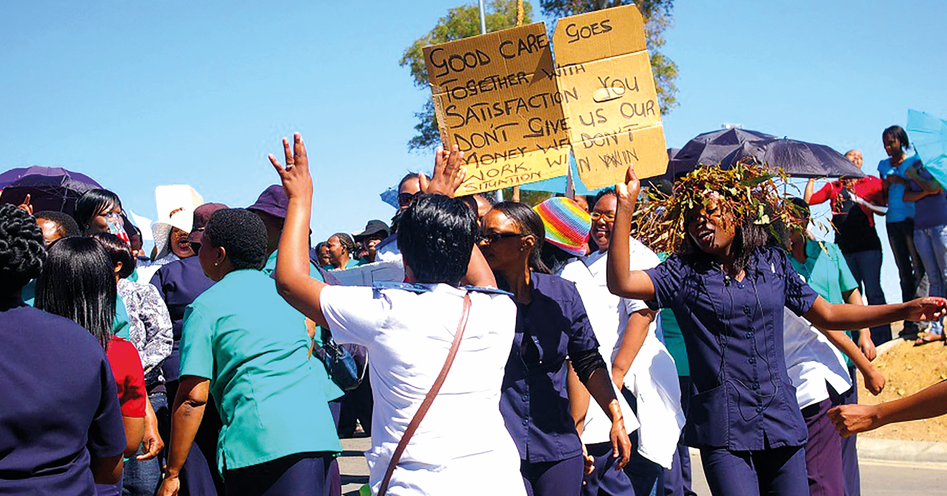The government’s absorption of former Tšepong nurses has left these dedicated health workers in an ongoing state of uncertainty, with their futures hanging in the balance.
The nurses, who were dismissed after going on strike to demand better pay at Queen ‘Mamohato Memorial Hospital (QMMH), have seen little progress in their transition to civil service status since the government terminated Tšepong’s contract in 2021.
After over 300 nurses were fired for demanding salary increases that mirrored their counterparts in other institutions, the government severed ties with the Tšepong consortium.
Officials promised that the nurses would be absorbed into the Ministry of Health and given the same benefits as civil servants. But here we are, nearly four years later, and the government’s promises remain unfulfilled.
While the nurses continue to receive their monthly salaries, they remain without any official documentation to confirm their status as civil servants. This glaring omission has led to widespread anxiety among the nurses, who fear they may be denied retirement and death benefits.
Despite their dedication and years of service, these workers find themselves caught in a bureaucratic mess, with no clear path forward.
Sources, speaking on condition of anonymity, revealed that despite repeated attempts to engage with the Ministry of Health, no satisfactory resolution has been reached.
“HR has informed us that we are not entitled to benefits due to our alleged illegal employment status,” the sources said. “Yet, the pension fund continues to deduct contributions from our salaries.”
In a bizarre twist, the only meeting held with the Ministry of Health, according to the sources, was a reading of public service laws, on Ministry premises, no less, without the presence of any relevant public service representatives.
The nurses said that the lack of formal recognition of their employment has also created additional barriers in their personal and professional lives.
“We cannot get loans, and our educational pursuits are on hold,” one nurse shared. “We are treated like second-class citizens at our workplaces. They call us names like ‘Ba Tsepong’ and refuse to give us uniforms because apparently we are not part of the budget.”
Lesotho Nurses Association (LNA) Spokesperson Busa Qhala confirmed that the association has received numerous complaints from affected nurses and has engaged with the Ministry of Health in an attempt to address their concerns.
“We have been in dialogue with the Ministry, but their administrative processes have proven excessively time-consuming,” Qhala explained. “In light of this, we implore the Ministry to expedite their actions as our members’ well-being is suffering in the meantime.”
Qhala emphasised that the primary issue revolves around the fact that these dedicated nurses will not be entitled to retirement benefits, despite pension contributions being deducted from their salaries.
Additionally, their beneficiaries will be denied death benefits in the event of their demise. Some nurses, nearing retirement, have exceeded the government’s minimum age for employment. If they retire without formal employment status, they will not be eligible for any government benefits.
“Despite the lack of formal documentation, the government has verbally acknowledged their employment,” Qhala noted. “It is crucial that this matter be addressed without further delay to safeguard the future of these workers.”
Matshona Libalele, Spokesperson for the Public Officers’ Defined Contribution Pension Fund, explained that the Ministry of Health’s Human Resources department is best positioned to answer questions regarding pension deductions from nurses’ salaries.
Libalele clarified that the employer is responsible for most of the paperwork involved in enrolling employees into the fund. After completing necessary preparations, the employer submits a list of eligible employees for membership.
“The Fund itself does not collect money directly from individuals,” Libalele stated. “Instead, the employer deducts a five percent contribution from the employee’s salary and pays it to the Fund. The Fund has no direct access to the salaries of its members.”
He also added that one requirement for pension membership is that employees must have at least 10 years left before retirement age.
‘Mateboho Mosebekoa, the Ministry of Health’s Public Relations Officer, stated that out of the more than 500 affected individuals, half have been fully integrated into the government system through a batch incorporation process.
Mosebekoa further explained that the remaining individuals must be part of a group whose files were impacted by the government embargo on new staff appointments.
However, she assured that the ministry’s human resources department is working to ensure all affected employees are integrated into the system and receive the same benefits as other civil servants.
She also noted that the HR department is investigating reports of mistreatment at the workplace.
Summary
- The nurses, who were dismissed after going on strike to demand better pay at Queen ‘Mamohato Memorial Hospital (QMMH), have seen little progress in their transition to civil service status since the government terminated Tšepong’s contract in 2021.
- In a bizarre twist, the only meeting held with the Ministry of Health, according to the sources, was a reading of public service laws, on Ministry premises, no less, without the presence of any relevant public service representatives.
- Lesotho Nurses Association (LNA) Spokesperson Busa Qhala confirmed that the association has received numerous complaints from affected nurses and has engaged with the Ministry of Health in an attempt to address their concerns.

Ntsoaki Motaung is an award-winning health journalist from Lesotho, specializing in community health stories with a focus on sexual and reproductive health and rights, as well as HIV. She has contributed to platforms like “Be in the KNOW,” highlighting issues such as the exclusion of people with disabilities from HIV prevention efforts in Lesotho.
In addition to her journalism, Ntsoaki serves as the Country Coordinator for the Regional Media Action Plan Support Network (REMAPSEN). She is also a 2023 CPHIA Journalism Fellow.








